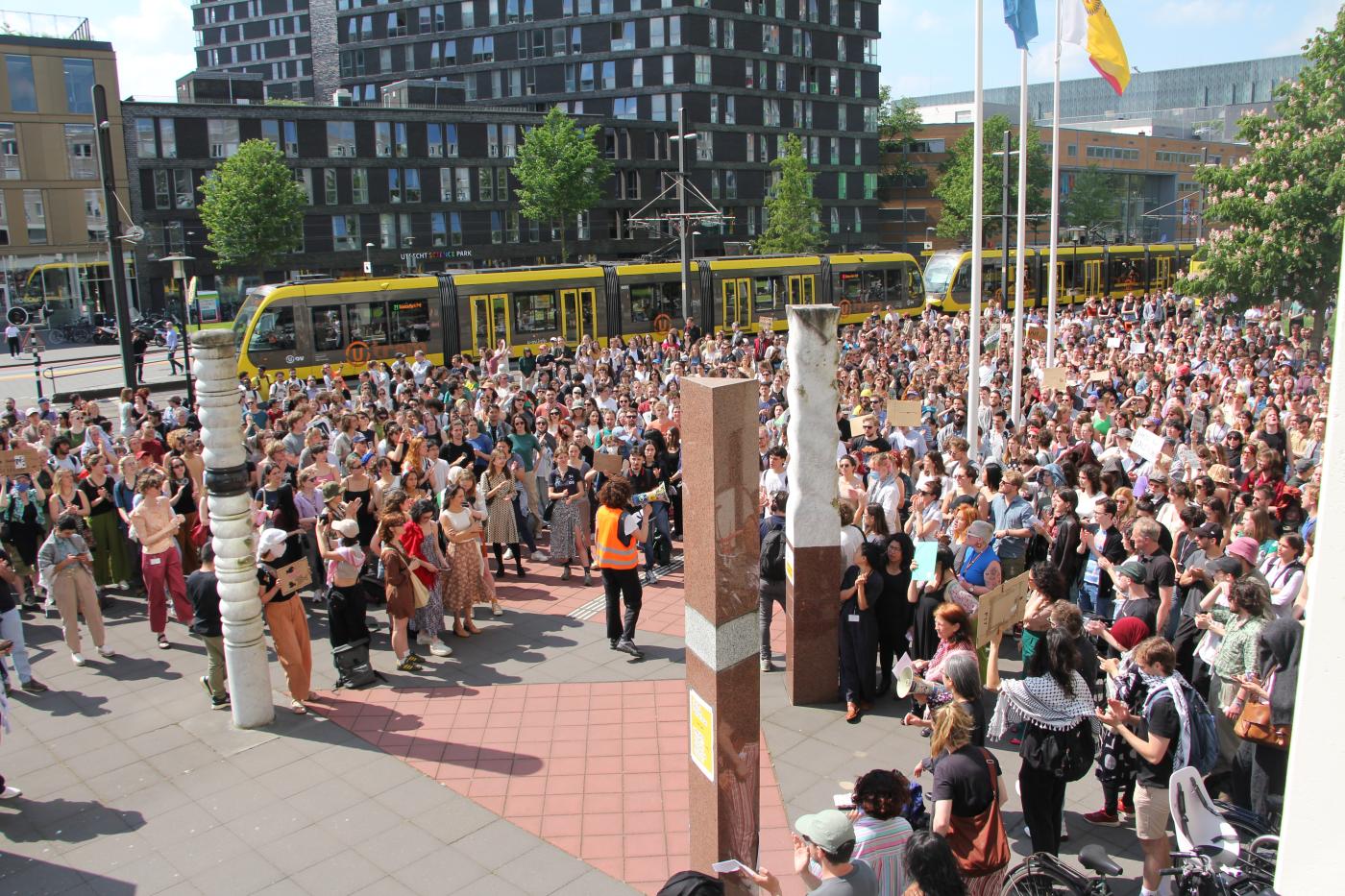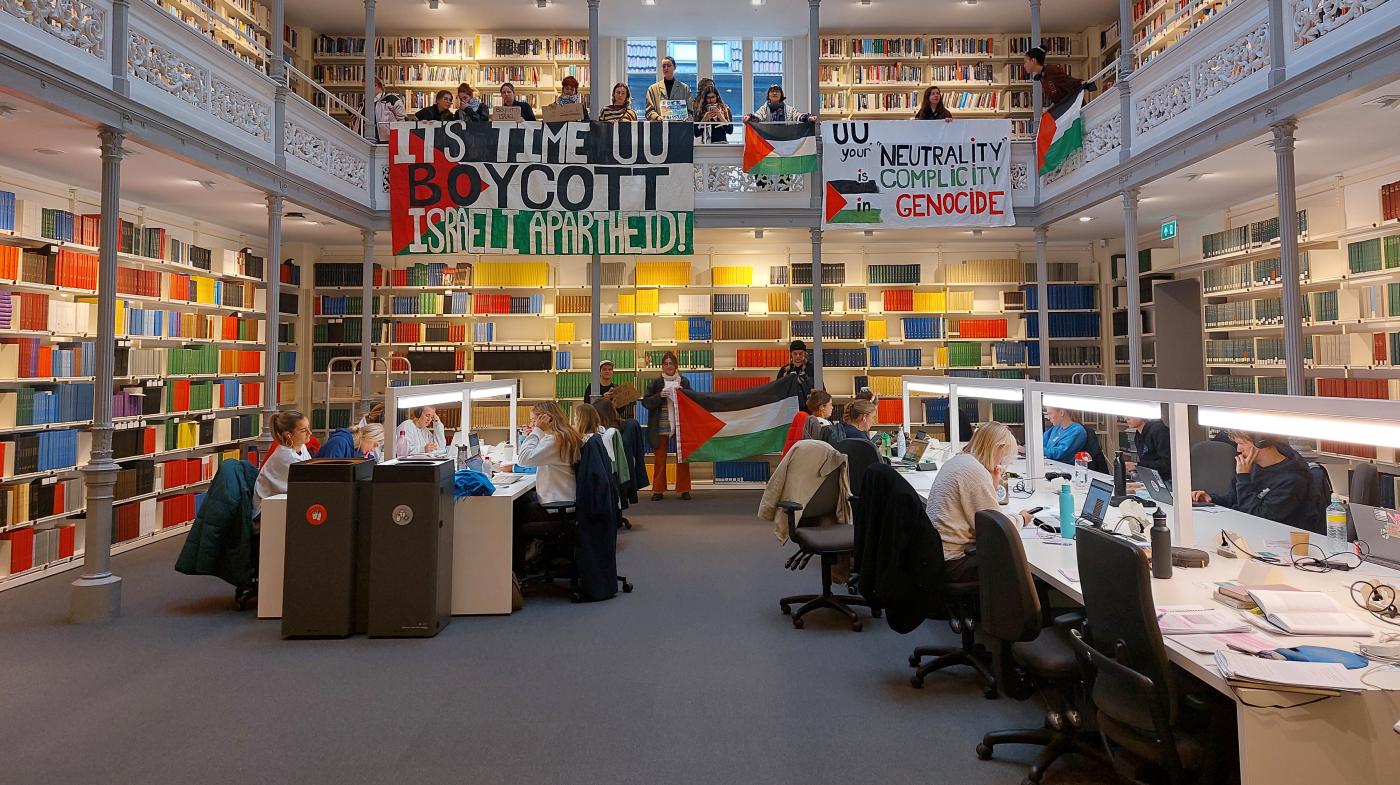FAQ about pro-Palestine protests at UU
Protests, occupations, ‘police violence’, ‘genocide...’ Are you still following?

What do the protesters want?
They want Utrecht University to cut its ties with Israeli universities. The several protests and occupations that happened in recent weeks called for an academic boycott against Israel. According to the protesters, Israeli universities are "an inseparable part" of systematic human rights violations in Palestine. Researcher Maya Wind, from the University of British Columbia, who gave a lecture at UU on May 14, argues that these universities perpetuate colonial violence. The demonstrators state that, by working together with Israeli universities, UU is indirectly contributing to Israel's actions in Palestine.
In addition to a boycott, the protesters demand UU take a stand. In an open letter penned on October 23 by Utrecht in Solidarity with Palestine (USP), students indicate that they find UU’s "neutrality" hypocritical. the demonstrators argue that, by not taking a stand, UU is going with the status quo, which in practice means they are not neutral but rather pro-Israel. Many UU students and staff would prefer to see UU speak out against Israel's colonisation and violence towards Palestinians.
Who are the protesters?
It is not a homogenous group. Most of them are students and employees of UU but people from outside the university sometimes join the protests as well. Up until now, Utrecht in Solidarity with Palestine (USP) has participated in all protests. They also called for protests. They are in favour of the Boycott, Divestments and Sanctions strategy as a means to put pressure on Israel. UU Scholars and Staff for Palestine are also active. They are very strict on non-violence. Contrary to USP, they are not an organised group but rather a collective.
In addition, there are students and staff who do not necessarily belong to a particular group but they join the protests in solidarity with the Palestinian population in Gaza. Others do so because they are in favour of a complete academic boycott. Furthermore, some students and staff join the peaceful demonstrations but not the occupations. The ambiguity of the groups makes it difficult to identify clear demands.
What types of protests have taken place up until now?
The first protest was the occupation of the courtyard of the city centre library on May 7. This protest was purely about the situation in Palestine and UU’s role in it. The protest that took place the following day was a response to the university's decision to call the police to clear the courtyard. It culminated in the occupation of the building situated at Drift 25. On May 9 (Ascension Day) they held a small-scale protest against police violence. On May 13, hundreds of students and staff walked out of the classroom to oppose UU's handling of the protests. Two days later, a protest to remember Nakba Day escalated into the occupation of the university building situated at Janskerkhof 15.
What does UU have to do with the conflict?
“UU shame on you, there’s blood on your hands!” Perhaps you’ve heard this slogan being shouted by the protesters. But why are they saying this? UU has various academic ties with Israel. USP states that these collaborations are problematic as Israeli universities are said to be involved in the occupation. Therefore, the demonstrators find that UU should discuss these ties and break them.
For some, last month's protests may seem to have appeared out of thin air, but students and staff have been making these demands for quite some time. A petition calling for a boycott of Israeli academic institutions was made in May 2021. UU announced its intention not to suspend collaborations with Israeli universities in November of that same year, in response to an op-ed signed by lecturer Layal Ftouni and student Itaï van de Wal. Tensions have increased following Hamas' attack against Israel on October 7, 2023. Even UU's anniversary celebrations were disrupted by pro-Palestine protests. The more dire the situation in Palestine becomes, the more heated the discussion at UU gets. The more serious the situation in Gaza becomes, the more protesters underscore UU's responsibility as a "big player."
In addition, the protesters stress that UU is known for its courses on human rights, genocide, conflict, and post-colonialism. USP's aforementioned open letter argues that UU's "neutral" stand on the conflict delegitimises this offer.

Pro-Palestine protest in the city centre library. Photo: DUB
What kind of ties are we talking about?
On May 17, following the demands from protesters, UU published an updated list of research collaborations with Israeli institutions. It includes 23 projects funded by the EU. The names of the projects and individual UU researchers working on them were not mentioned "given the polarisation surrounding this issue," UU says. "We are not involved with projects related to defence or involving a risk of dual-use by defence," the website states. Even so, UU has announced that it will critically re-evaluate all ongoing collaborations.
When it comes to student exchange programmes, UU is working together with three Israeli universities, but the programmes have been put to a halt.
How is UU responding to activists' demands?
On May 15, the Executive Board updated its statement regarding the situation in Gaza and Israel. In this new statement, the university expresses its concerns about the ongoing violence but reiterates that it does not believe that ending collaborations is the solution. The Executive Board stresses that universities and academics can bring about change. In its statement, the board also mentions that political stances do not suit the university. They want dialogue to remain possible even when tensions rise.
In addition, UU has disclosed ongoing projects with Israeli universities. If a critical evaluation shows that certain collaborations do "contribute to the cycle of violence," they promise to put the collaboration to a halt. UU has also promised to complete this evaluation before the summer break (Solis ID required to open the link, Ed.).
About the protests, the university administration says they are following the UNL directive. Protesting is part of democracy, but according to the new house rules, occupying university buildings is not allowed. It is up to the university to decide about the consequences. The occupations of May 7, 8 and 15 led to evictions at the university's request, as the Executive Board considered that the safety of both protesters and others involved could not be guaranteed.
What’s going on at other universities?
These protests are part of a larger movement. Pro-Palestine demonstrations at Dutch universities seem to have intensified following similar protests at US universities, which also involved encampments. This strategy has been adopted not only in the Netherlands but in other European countries. There have been protests at several universities, but not always in the same way. UvA students were the first to set up a tent camp on the university campus on May 6. In Maastricht, activists in a tent camp even started a hunger strike, which they stopped seven days later.
What’s the next step?
A USP spokesperson says the actions will continue until their demands are met, as they have called out during every protest. Evaluations of UU’s ties will not change that. "In Gaza, they don't have time either," the spokesman said. When and how the protests will take place is not known.